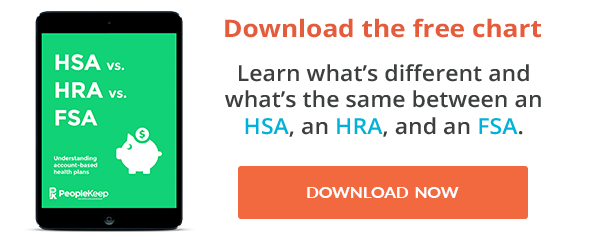 US. Health insurance costs are rising steadily. To combat the growing health care costs, employers are adopting account-based health plans (ABHPs) as a strategy to reduce healthcare costs without reducing coverage for employees. Two popular forms of ABHPs are Health Savings Accounts (HSAs) and health flexible spending accounts (FSAs). This article compares these two types of ABHPs
US. Health insurance costs are rising steadily. To combat the growing health care costs, employers are adopting account-based health plans (ABHPs) as a strategy to reduce healthcare costs without reducing coverage for employees. Two popular forms of ABHPs are Health Savings Accounts (HSAs) and health flexible spending accounts (FSAs). This article compares these two types of ABHPs
. Tip: This article contains excerpts from our new e-book "HSA vs. HRA vs. HRP vs. FSA, Account-Based Health Plans to understand." Download the free guide here.
What is an Account-Based Health Plan?
a ABHP is a consumer strategy that pairs a group health insurance with a tax-advantaged medical expenses account. are instead a group health insurance
Health Savings Accounts (HSA)
HSAs single bank - With a total replacement ABHP that medical spending account offered as the main health care plan. Accounts of staff in possession, allowing for tax-free payment or reimbursement of eligible medical expenses. An employer usually provides an HSA qualified high deductible health plan and an HSA.
The employer, employee, or a third party can contribute to an HSA. The maximum contribution amount for 2015 is $ 3,350 for an individual and $ 6,650 for a family. In addition, the employee must have an HSA qualified high deductible ($ 1,300 for individual deductible and $ 2,0 deductible for families) health insurance.
The employee may be reimbursed for medical care costs, as determined by the Internal Revenue Code defines (IRC) 213 (d) and insurance premiums for the unemployed. Unused HSA funds can be transferred to the following year. In addition, rolling over to the funds to the next year, as HSAs are portable employees terminated in the case. The staff has continued access to the account balance is not used.
There penalties for the production of non-medical withdrawals are associated. If an employee makes a non-medical withdrawal, they are subject to income tax and 20 percent penalty tax. However, once the account holder 65 years of age (Medicare eligibility age) reached, or dies, withdrawals for non-medical purposes subject to income tax, no penalty for non-medical withdrawals.
Read. More about health savings account 2015 rules and requirements
Health Flexible Spending Account (FSA)
health FSAs are employer-benefit plans that allow for tax-free reimbursement of eligible medical expenses. Unlike HSAs, FSAs can not be used on health insurance premiums. The employer and employee can contribute to both an FSA.
The maximum annual contribution for an FSA is determined by the employer, but is rising at $ 2,500 per employee for the year 2014 with an annual inflation capped. An employer may offer all their employees FSAs. Moreover, unlike HSAs FSAs are not tied to a health insurance. An employer may offer health insurance without an FSA high deductible.
The FSA is managed by the employer or by a third party administrator. While the employer can choose whether to allow the funds to be transferred to the next year, the rolling amount is limited to $ 500th In contrast to a HSA FSAs are not portable. FSAs can not be maintained if the employee no longer works for the employer.


0 Komentar